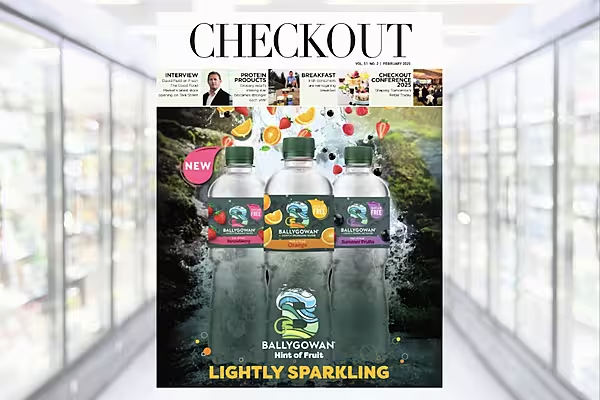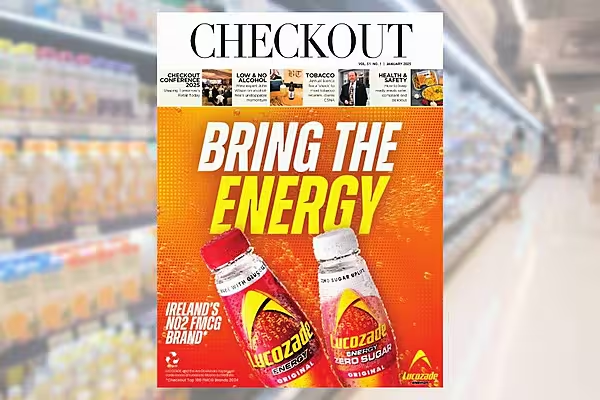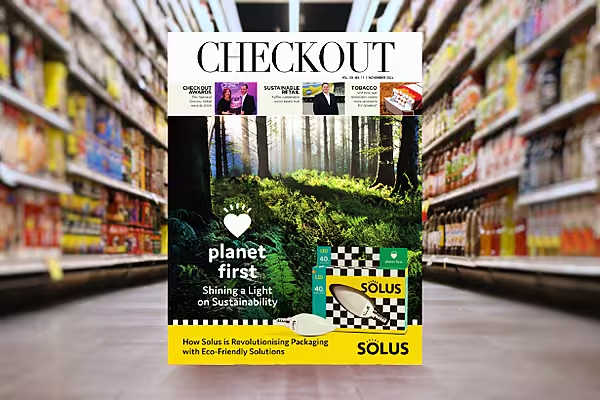With the news that Musgrave is to bring to an end to the Superquinn name next February, Stephen Wynne-Jones caught up with its ebullient founder, Feargal Quinn, to discuss the legacy that the brand leaves behind. This article first appeared in the August 2013 edition of Checkout.
When considering the final few years of the Superquinn brand, perhaps the final lines of F. Scott Fitzgerald’s The Great Gatsby sum it up best: “And so we beat on, boats against the current, borne back ceaselessly into the past.” Superquinn, which will be morphed into SuperValu next February, is a retailer for whom past glories were everything – the legacy that its founder, Feargal Quinn, established was strong enough to see off the advances of countless rivals and at least three recessions. The very fact that nine Taoisigh have sat in Leinster House since Feargal established his first store in Dundalk is an illustration of the brand’s great staying power.
Yet, when the current recession hit, they told us that it would be “different”, and it was. With Feargal no longer at the helm, Superquinn, historically a retailer where customers were quite happy to pay a few pence more for added quality, was struggling. An opportunistic swoop by Musgrave in 2011 looked to have saved the brand from extinction, yet despite the best efforts of those in Lucan (and Cork), the economic current proved too strong. As Aldi and Lidl prospered, and those at the top scrambled to retain market share,
Superquinn remained the odd man out, a retailer in need of a shift in direction, yet one with one of the most loyal and long-standing customer portfolios in the Irish grocery market. Thus, the announcement on 7 August, that Musgrave was to bring the Superquinn retail brand to an end, came as no great shock. Will those same customers maintain their loyalty once Superquinn’s iconic locations are rebranded as SuperValu? Musgrave is confident that they will, but it has a lot of work to do between now and February to convince the diehards.
Checkout caught up with the man himself, Feargal Quinn, founder of the chain that, come February, will no longer bear his name, to discuss where Musgrave should go next and to look back on a legacy that dates back to 1960.
Point Of Difference
For Feargal, very much a man of the people, the Superquinn announcement broke while the erstwhile businessman was in a very public arena, at the RDS, judging the stalls at the Dublin Horse Show. “I knew about it prior to the announcement, but when the story broke, my phone kept ringing with people asking me, ‘Did you hear ...?’ The number of people that got in touch with me around Blackrock and Sutton and Walkinstown, that have only really ever shopped in Superquinn, they couldn’t believe that it’s going to be changing to SuperValu.”
Feargal believes that the move “makes sense from a financial point of view”, also, the geographical opportunity presented, enabling the SuperValu brand to penetrate the capital in one fell swoop, is a clear advantage. What heartens him is the fact that Musgrave has pledged to retain the Superquinn name on products for which the brand has become famous. “I think to lose all the aspects that made Superquinn different would be a shame, whether it’s the bakery, the sausages or the customer service,” he explains.
“Also, Musgrave have taken the 2,500 employees working for Superquinn and made them real ambassadors for the changeover. I was in one store yesterday, and a customer said to me that she was delighted that the staff were not disillusioned about the move to SuperValu. That, to me, is critical. If the personnel weren’t on board, it would become a lot more difficult to convince the customer.”
When it comes to convincing the customer, of course, Feargal is arguably the best in the business. What differentiated Superquinn through its glory years were the little things that made people come back again and again – the “boomerang principle”, as Feargal calls it. “It was really about making it a destination. The key was to get people to drive past your competitors to come to you. Before I started Superquinn, I worked in Lipton’s [a long-departed UK-owned chain], and they used to tell us that when a customer comes into the shop, you may never see her again, so try to get as much money off her as you can. I said to myself from the very beginning, that’s not the way we’re going to operate here.”
Feargal’s hands-on, customer-first philosophy also caught the eye of his competitors, and he recalls a visit from one particular operator very well. “I was working in Blackrock one afternoon, and the barrier on the car park wasn’t working, so I was at the front door, offering free doughnuts to customers. That day, Margaret Heffernan came in, along with Andrew Street, who had only just arrived in from England, and she was showing him around the competition.
“A customer came up to me with her child, who happened to be wearing an Ireland jersey. I pretended to ignore the child, and told the customer, ‘You can only get a free doughnut if you’re wearing something green.’ The child started tugging at his mother’s shirt, but we continued to chat away, pretending not to notice. ‘Honestly, if you’re not wearing something green, I can’t give you a doughnut.’ After about two minutes, I finally turned to the child – ‘Oh, I didn’t see you there!’ – and gave him a doughnut. It made his day. Margaret turned to Andrew, who had been watching the whole thing, and simply said, ‘THAT’S what we’re up against.’”
The fact that 12 years later, Street left Dunnes to become Superquinn chief executive for a short period to the Musgrave takeover, is typical of the “boomerang principle” fostered at Superquinn.
Solid Foundations
One of the sad aspects of the Superquinn closure is that it is one of only two operators – Dunnes being the other – that can truly be said to have witnessed the complete evolution of supermarket shopping in this country. It seems incredible to think that when Feargal opened his first store, the concept of self-service shopping – as opposed to products being located behind the counter – was still alien to most people.
“We were probably the first supermarket chain outside Dublin to offer self-service. There were two McCourt’s shops in Dundalk that had it, but they were a lot smaller than we were. When we first opened, my father came down to wish me well, and he encountered people bringing their shopping home in the wire baskets we had at the shop. They didn’t realise they weren’t supposed to bring them home with them.”
In order to be the best in this country, Feargal and his team travelled the world, engaging with retailers and learning all the time about new concepts coming on stream. Feargal himself was a member of CIES (now the Consumer Goods Forum) and FMI, the Food Marketing Institute in the US, and later EuroCommerce. To make Superquinn succeed, he wanted to cast his net as widely as possible. “One of the things that we did was get anybody that was in charge of a particular department a subscription to an English-language grocery magazine from another country – the US, Australia, New Zealand. When Damien Kieran (now the operator of SuperValu Mount Merrion) was at Naas, he read about salad bars being introduced in supermarkets in California, so he brought the concept here, and introduced it to the store. Only a year later did we find out that it was the first supermarket salad bar in Europe.”
Some of Superquinn’s best-known in-store initiatives were reappropriated from European operators and given a uniquely Irish slant. The bakery, introduced in 1973, came about following a trip to a Carrefour hypermarket in Caerphilly, Wales, while the famous sausages originated after a fact-finding mission to Nuremberg, Germany. “During the seventies, we began to concentrate very heavily on fresh food,” says Feargal, “and then pizza, and then pasta and salads. We came up with the ‘Kitchen’ concept: Pizza Kitchen, Pasta Kitchen. The only one that didn’t work for us was when we started selling soup in our Blanchardstown store. We called it ‘Soup Kitchen’. There were certain connotations with that name that didn’t quite work.”
‘Thrift’, Superquinn’s discount private-label brand, was, similarly, one of the first in the country, and borrowed heavily from the ‘yellow pack’ introduced by Galen Weston in Canada. “When we announced it, Quinnsworth, which was also owned by Galen Weston at the time, rushed out and brought in their own yellow pack as soon as they could. The issue for us, when it was launched, was whether we would put all the Thrift products in one aisle, or place them beside their branded alternatives. We decided to put them all in one aisle, and immediately got criticism for it. People called it the ‘social-welfare aisle’, and it wasn’t necessarily positive to be seen shopping there. “We missed a trick, but I think Thrift went on to influence many other private-label lines – SuperValu’s Daily Basics, for example.”
Building On Its Reputation
The fact that Superquinn owned and operated all the stores in its portfolio (at least up until the Select Retail Holdings takeover) also gave Feargal an advantage over its competitors. “In many cases, we ran the whole shopping centre, such as in Ballinteer and Knocklyon. We built the supermarket and a lot of shops around it.” Arguably the most groundbreaking of Superquinn’s store openings was in Blackrock, which opened in 1984, “in an area where people had never heard of us. Dunnes Stores in Cornelscourt had been there for many years, but it was a different type of shop. Blackrock was a game-changer.
“I remember the night before we opened, I was quite concerned that we looked too expensive, so we put huge posters up at each gondola end showcasing special offers. People said to us, ‘It’s a classy shop. Why do you feel the need to put these signs up?’ But we didn’t want people to walk in and think, ‘It’s a lovely shop, but I can’t afford to buy anything.’”
SuperClub, launched in 1993, was another groundbreaking initiative, based loosely on a scheme undertaken by Ukrop’s in the US and launched at the same time as Belgian retailer Delhaize’s own scheme – “I still joke with them about which came first.” Again, Superquinn wasn’t quite sure how the process would work. “We weren’t sure initially whether we could only give it to our best customers, or give it to any customer that asked for it, but it was innovations like SuperClub, or online shopping [launched in 2000, ahead of the rest of the market] that were very different to what was in the marketplace at the time – it really kept us ahead of the competition.”
When Feargal sold Superquinn in 2005 to Select Retail Holdings, at the height of the economic boom, the price paid, €450 million, seemed small at the time. Indeed, this magazine ran an editorial examining ‘How Feargal Could Have Made Much More From the Sale of Superquinn’ in December 2006. Six years on, when the chain was sold to Musgrave in 2011, taken out of receivership for a sum of €229 million, it seemed a shrewd business move.
Looking forward, Feargal is confident that while the Superquinn name will soon be removed from the door, the legacy that the retailer founded is in safe hands. Although, he adds, perhaps a shift in the management arrangement might be welcome in the medium term. “What has been the main strength for Musgrave is that all its SuperValu outlets are owned by the individuals, and therefore have a much better opportunity to adapt to their consumers’ needs. “Musgrave intends to run the former Superquinn stores from head office, while the SuperValu outlets will continue to be run by private entrepreneurs. There’s a clear difference there, and I’m not sure in the long term if they [Musgrave] will decide if that’s the best approach.”
And if Musgrave is looking for any advice on how that might be achieved, there’s no better man whom it could call.









